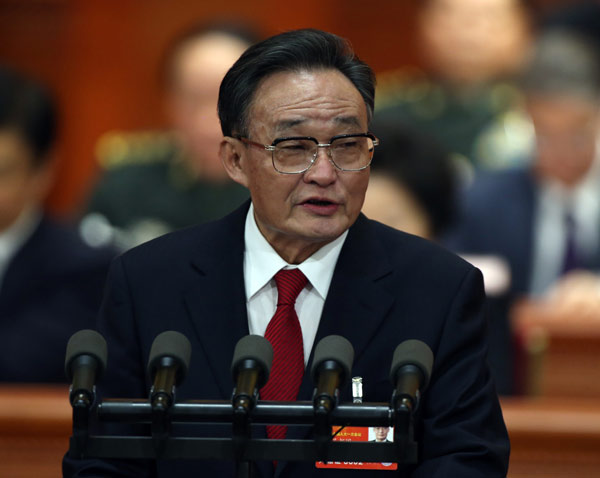Laws on key issues to be amended
|
 Top legislator Wu Bangguo delivers an annual work report to NPC deputies in Beijing on Friday. Wu Zhiyi / China Daily |
Environmental pollution, land disputes among issues on legislative agenda
Experts believe this year's National People's Congress legislative plan, which includes a list of issues attracting widespread public concern, can bring legislative work closer to social progress.
A number of laws dealing with issues currently confronting China, including environmental pollution and land disputes, will be amended this year, top legislator Wu Bangguo told an ongoing plenary session of the NPC on Friday.
Making an annual work report to NPC deputies, Wu also stressed that China has never copied Western political systems.
"We fully understood the essential difference between China's system of people's congresses and Western capitalist countries' systems of state power, resolutely resisted the influence of all kinds of erroneous thought and theories and maintained a firm and clear position on major issues of principle," he said, while reviewing the top legislature's work for the past five years.
The draft amendment to the Environmental Protection Law, which highlights government responsibility in environmental protection, was submitted to lawmakers for review in August for the first time. Wu said the top legislature will continue deliberating the draft this year.
Cao Mingde, an environmental law professor at China University of Political Science and Law, said he hopes the second reading can take in a suggestion to allow more public involvement in promoting a green and low-carbon society, especially in rural China.
Alecken Eminbahe, chairman of the Standing Committee of the Xinjiang People's Congress, said revision of the environmental code is a move to answer public concerns, which reflects the principle of coordinating legislative work with ongoing major issues in society.
Gao Ali, an NPC deputy and principal of Shangqiu Experimental Primary School in Henan province, said more attention should be paid to children, and called for a law on campus security.
"There seem to be more violent cases in kindergartens and primary schools in recent years, but there's no special law for campus safety," she said.
Apart from legislative work, Wu said the NPC also plans to ask the State Council to deliver reports on issues of high social awareness this year, such as urbanization and anti-graft work - the two priorities that China's new leadership has emphasized to drive economic growth and promote political integrity.
Hu Zhongxiong, mayor of Yiyang city in Hunan province and an NPC deputy, said the top legislature has greatly improved supervision over the government in the past five years by conducting hearings on some issues of widespread concern. But he said he believes such supervision can be further enhanced by introducing questioning of government officials.
Experts said hearings and questioning are legal means by which people's congresses oversee governments, courts and procuratorates. Hearings are "mild", but questioning can be very harsh, usually with criticism, they said.
The top legislature started its first hearing on State Council officials in June 2010 on fiscal and taxation issues. So far it has conducted nine hearings.
"With experience accumulated in the nine hearings, I think it's time to adopt stronger supervision measures, such as questioning," Hu said.
Cui Jia, Zhu Zhe and An Baijie contributed to this story.
























